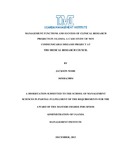| dc.contributor.author | Were, Jackson | |
| dc.date.accessioned | 2019-11-04T12:50:37Z | |
| dc.date.available | 2019-11-04T12:50:37Z | |
| dc.date.issued | 2013-12 | |
| dc.identifier.citation | Were, Jackson.(2013) Management Functions and Success of Clinical Research Projects in Uganda. A case of Non Communicable Diseases Project at the Medical Research Council | en_US |
| dc.identifier.uri | https://hdl.handle.net/20.500.12305/807 | |
| dc.description.abstract | The study examined the relationship between management functions and the success of the non-communicable disease (NCD) project, a clinical research project at the Medical Research Council (MRC). Specifically, the study strived to determine the extent to which planning, organizing and controlling influenced the success of non-communicable diseases project at MRC. The study used a case study design using both quantitative and qualitative approaches on an accessible populations of 110 staff who were directly involved with the NCD project of which 86 were sampled. Data was collected using a questionnaire and interview guide. Quantitative data was analyzed using frequency, mean and standard deviation, correlation and regression analyses. The study found out that planning function had a high positive significant relationship with project success and it predicted 26.2% of the variance in the NCD research project success. Organizing had a high positive significant relationship with project success and it predicted 22.8% of the variance in the NCD research project success. Controlling had a high positive significant relationship with project success and it predicted 23.6% of the variance in the NCD research project success. The study concluded that success of scientific research projects depends on the extent to which management of the institutions examines and establishes the external and internal factors that may impact on the project leading to development of relevant strategies; develops appropriate and adequate project schedules; identifies and plans for the required project needs; establishment of a responsive organizational structure, establishment and communication of project policies and procedures; establishment and observance of pre-controls, concurrent and post controls. The study recommends that the management of MRC and related scientific research institutions should always conduct strategic planning retreats moderated by internal and external strategic management consultants to offer expertise; establish project or matrix organizational; communicate the project proposal to project implementers at the different levels as a policy document for identification of deviations and taking of corrective actions; and continuously strengthen the internal controls that may compromise the effectiveness of the control function in MRC. | en_US |
| dc.language.iso | en | en_US |
| dc.publisher | Uganda Management Institute | en_US |
| dc.subject | Management Functions | en_US |
| dc.subject | Success | en_US |
| dc.subject | Clinical Research Projects | en_US |
| dc.subject | Uganda | en_US |
| dc.title | Management Functions and Success of Clinical Research Projects in Uganda. A case of Non Communicable Diseases Project at the Medical Research Council | en_US |
| dc.type | Thesis | en_US |

